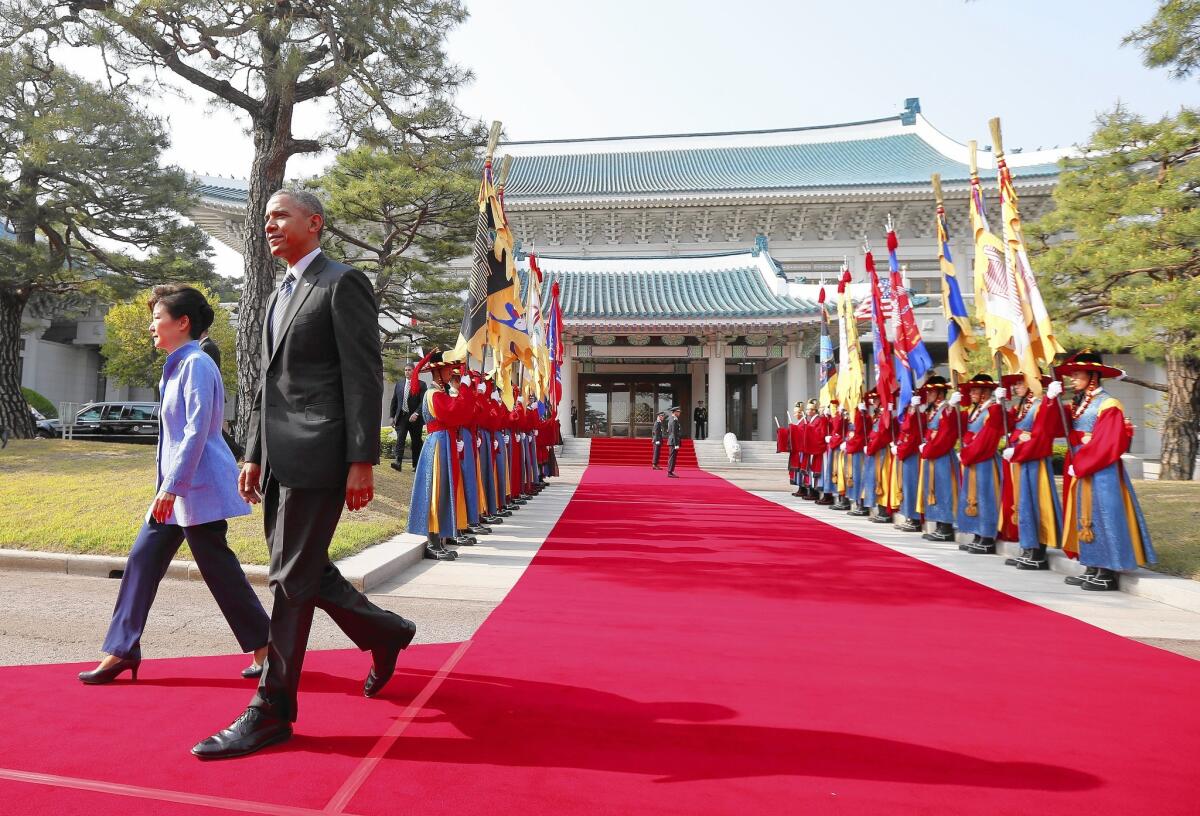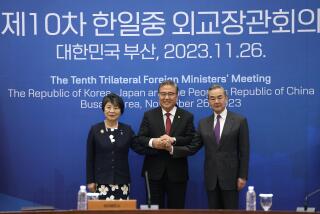Obama’s foreign policy goals struggling on several fronts

SEOUL — Halfway through a long-delayed visit to four allies in Asia, President Obama is struggling to sell a foreign policy strategy that seems under siege on multiple fronts.
When he landed in Seoul on Friday, Obama had not locked down a key portion of a long-promised Pacific Rim free-trade deal, had made scant progress in forcing Russia to retreat on Ukraine, and had just seen his administration’s Mideast peace efforts put on life support.
The setbacks involved unrelated disputes thousands of miles apart, but together they dealt a harsh blow to the president’s second-term foreign policy agenda, including its much-touted rebalancing of U.S. strategic interests to the Asia-Pacific region.
The failure of the trade deal in particular has “taken some of the oompf out of the rebalance,” said Michael O’Hanlon, director of research for the foreign policy program at the Brookings Institution.
The disappointments also left Obama musing philosophically about the limitations on presidential power, and about problems over which he has little or no control.
“I think that there are no guarantees in life generally, and certainly no guarantees in foreign policy,” he said at a news conference in Seoul with South Korean President Park Geun-hye.
Those looking for “definitive answers” are unlikely to find them, he said. Instead, “you’ve got some tools in the toolbox; you try to figure out which ones have the best chance of working. Sometimes it’s going to take time to see whether or not a particular approach worked or not. You may not know until after the fact.”
The facts made for a bruising week. Obama spent two days with Japanese Prime Minister Shinzo Abe in Tokyo but failed to reach a breakthrough on the proposed 12-nation Trans-Pacific Partnership, the economic underpinning of the administration’s rebalancing.
Despite a last-minute push through the night Thursday, U.S. and Japanese negotiators could not break the logjam on tariffs and market access to the region that is the heart of global trade. Instead, the nations acknowledged that they had fallen short of their goal.
Although the joint statement said they had “identified a path forward on important bilateral TPP issues,” it gave no specifics and noted that “there is still much work to be done to conclude TPP.” The Obama administration had hoped to wrap up the agreement at the end of last year.
“There was clearly progress, but ultimately this was a missed opportunity for both Washington and Tokyo,” said Matthew Goodman, former director for international economics in the administration and now an analyst at the Center for Strategic and International Studies.
No further talks between the U.S. and Japan were immediately scheduled, raising questions about whether there could be meaningful progress before the next meeting of trade ministers from all 12 countries, in mid-May.
“The critical period is between now and then,” said Jay Eizenstat, a Washington lawyer at McDermott Will & Emery and a former U.S. trade representative negotiator. “This notion of a pathway may be illusory if there’s no definition given to what that means.”
Obama acknowledged Friday that the path forward in the Middle East was equally difficult to discern.
Palestinian Authority President Mahmoud Abbas’ decision to try to form a unity government with the militant Islamist group Hamas was “unhelpful” but “just one of a series of choices that both the Israelis and the Palestinians have made that are not conducive to trying to resolve this crisis,” Obama said.
The two parties need to walk toward a two-state solution together, he said.
“Do I expect that they will walk through that door next week, next month, or even in the course of the next six months? No,” Obama said, adding that the U.S. would “continue to try to offer constructive approaches that could lead them to go ahead and take those steps.”
Noting that he has to “worry about a bunch of different problems at the same time, and not just pick and choose which problems that I have the luxury to worry about,” the president defended his strategy with appeals for patience and keeping an eye on the long view of history.
The conflict in the Middle East, he said, is deep and decades old. “We didn’t anticipate that we were going to solve it during the course of a six- or nine-month negotiation,” he said.
The menace of a nuclear-armed and bellicose North Korea is long-standing, “and we are not going to find a magic bullet that solves this problem overnight.”
Russian President Vladimir Putin’s incursion into Ukraine will take a toll on Russia’s economy, its position in the world and its relations with the U.S. “And I suspect that that’s going to linger for some time to come,” Obama said.
He acknowledged that sanctions had not forced Putin to change his aggressive course in Ukraine and he suggested that another round was in the pipeline. Obama spoke by phone with several European leaders Friday evening to discuss the proposed new penalties.
“President Putin is not a stupid man,” Obama said, adding that he thought the Russian leader would eventually respond to economic pressure.
So far, officials said, Russia remains a partner in the international coalition conducting nuclear talks with Iran, the current bright spot in Obama’s foreign policy portfolio. Negotiators are expected to begin drafting a comprehensive agreement next month in Vienna and hope to complete a deal by late July.
Obama heads Saturday to Kuala Lumpur, the capital of Malaysia, the first president to visit the Muslim nation since Lyndon B. Johnson.
Obama is likely to face questions there about his decision not to meet with Anwar Ibrahim, the country’s main opposition leader. Ibrahim was sentenced to five years in prison on charges of sodomy, a conviction critics say is an attempt to block his run for office.
kathleen.hennessey@latimes.com
Parsons reported from Seoul and Hennessey and Lee from Washington.
More to Read
Sign up for Essential California
The most important California stories and recommendations in your inbox every morning.
You may occasionally receive promotional content from the Los Angeles Times.











